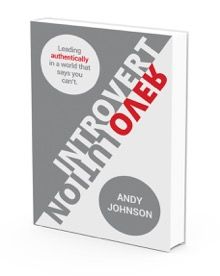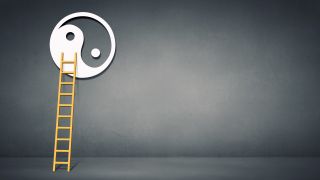Introversion
Who Says Extroverts Make Better Leaders? Part 1
Forget the stereotypes. Take your quiet power to the top.
Posted August 28, 2015

Introverts, take the lead! So urges Andy Johnson, the introvert, leader, executive coach, and licensed counselor who wrote Introvert Revolution: Leading Authentically in a World That Says You Can’t. Johnson is leading the charge to eradicate the bias against introvert leadership. In this first installment of a two-part series, he sheds light on the plight of the introvert leader.
NA: Why did you write Introvert Revolution?
AJ: I wrote it to help introverted leaders who desperately need validation and to give them ammunition in the battle against the cultural bias that deeply impacts them on so many levels. I wanted to give the introvert movement a clear discussion about authentic introvert leadership and to advocate for an extrovert*-introvert balance within the leadership of organizations. I wanted to directly attack shame as a toxic force in the life of the introverted leader. Additionally, writing the book was personally cathartic, allowing me to revisit the path I’ve been following away from bias and its deleterious effects. As an introvert, writing helps me better understand what I think and feel.
NA: All of that sounds meaningful, Andy, both for you personally and for society. To help frame our discussion, how do you define leadership?
AJ: I like the definition of social psychologists Haslam, Reicher, and Platow, who say leadership is “the process of influencing others in a manner that enhances their contribution to the realization of group goals.” This definition nicely combines references to the yang (outward, active orientation) and the yin (inward, reflective orientation) of leadership.

In the West (traditionally yang), we tend to emphasize individual and charismatic leadership. In the East (traditionally yin), interdependence and collaboration are prized, and character matters most. Real leadership is a combination of the two: leading as one of the group to achieve a group goal. It’s less about ego and more about serving others and helping them become all they are meant to be.
NA: Much has been written about the myths and biases surrounding introversion. In Introvert Revolution you share how these biases have deeply affected you. If you could change one bias around introversion, what would it be?
AJ: I would eliminate the stereotype that introverts are somehow antisocial or misanthropic. I too often see posts on the Internet, even from introverts, suggesting that introverts want to be alone most of the time. This is a misunderstanding of the core of introversion, so it couldn’t be further from the truth.
For example, I’m a social introvert: I love people and the deep interactions I can have with those I’m closest to. I do need some time alone to think, write, create, or work on complex problems—but all this work is about helping people I know and love. I really couldn’t be more social, and I’m very introverted. That’s not a contradiction. Many have said it, and it’s true: introverts just relate differently.
NA: I also relate to being a social introvert—as oxymoronic as that sounds to some people! On another note, I'm sure many of my readers have read the work of Jennifer Kahnweiler, Ph.D., author of books including The Introverted Leader and Quiet Influence. What is different about your approach to helping introvert leaders?
AJ: I love Jennifer’s work and the fact that she, an extrovert, advocates for introverted leaders. I just finished her latest book, The Genius of Opposites, in which she describes the need for us to work together, in partnership. This is the same thing I call “balanced leadership” or “yin and yang leadership.” My approach complements hers: she understands introversion from the outside; I’m addressing it from the inside. As an introverted leader, I know firsthand what this feels like.
In addition, I give more attention to the stark differences between yin and yang cultures to help us understand the problems introverts face in the West. I also focus more on the psychological impact over time of living in an introvert-toxic environment.
The feedback I’ve received from introverted leaders who’ve read my book confirms that my insider insights deeply resonate with them and validate their experiences and struggles.

NA: I appreciate the airtime you’ve given to those struggles, Andy. What is the hardest thing about being an introvert leader? How do you advise tackling it?
AJ: The hardest thing is being misunderstood. People not “getting” us leads to overt or covert rejection and invalidation of us as leaders (and even people)—and invalidation of our ideas, plans, and dreams. Misunderstanding from others can lead to misunderstanding ourselves. Worse, it often leads to shame: the sense that “there’s something wrong with me.”
The level of misunderstanding in our culture is so deep and pervasive that correcting it seems at times like a Sisyphean task. We’ve got to counter myths with truth, stereotypes with science, ignorance with enlightenment. There is no substitute for a deeper knowledge of the reality and beauty of introversion. Knowledge is power. To that end, I’m so glad to see the rising up of so many fellow soldiers in this battle for temperament equality. While introverts continue to push to be better understood by others, we can at least come to understand ourselves.
NA: Thank you for validating and inspiring us.
In the second part of this interview, Johnson will share tools and tips to help introvert leaders succeed.
*Also spelled "extraverts" by Carl Jung and the communities of the Myers-Briggs Type Indicator® and other personality assessments such as the Five Factor Model.
Copyright 2015 © Nancy Ancowitz




